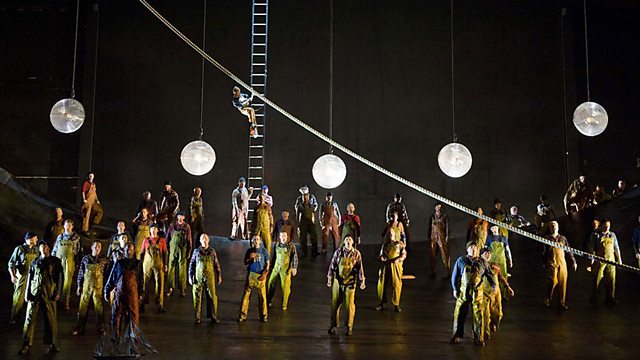

Hetzer's set in Act I is impressive: a giant metallic installation with disturbing lights and flashing numbers, and Gloger’s idea of putting us at sea in a hyper-modern world works well enough - although I can’t help feeling that the golden opportunity for a coup de théâtre presented by the arrival of the Dutchman’s ghostly ship is rather lost when the arrival consists of Samuel Youn walking on-stage with a shiny black item of cabin luggage. According to an interview in the programme notes, Gloger started with Wagner’s concept of “longing for calm amidst life’s storms,” searched for a metaphor that suited our times more closely than the sea and, with designer Christoph Hetzer, came up with “a complex data network, an ungovernable world market, a metropolis seen from the air.” The staging that results from this concept is notable by the total absence of the sea or any ships larger than a rowing boat. Jan Phillipp Gloger is an acclaimed theatre director who is relatively new to opera: his debut was at Augsburg in 2010 and this is his first opera at Bayreuth. Franz-Josef Selig seemed uncomfortable with his acting duties as Daland, but thoroughly in command of the music Michael König as Erik was a shade off full power in Act II but pulled out all the stops in Act III Benjamin Bruns was a clear-voiced and appealing Steersman. Samuel Youn was drafted into the title role at late notice after an unfortunate incident with Yevgeny Nikitin, a journalist and a swastika tattoo: the management must have been delighted with their choice as he produced a musically precise and impassioned performance. Pieczonka’s performance was the more remarkable since, as a Bayreuth veteran pointed out to me after the show, there was a basic directorial mistake of putting a curtained off stage-within-a-stage in Act II, which, he explained, would have made it very difficult for the singers to hear their own voices against the orchestra. Adrienne Pieczonka was an outstanding Senta: the timbre of her voice was meltingly gorgeous, intonation perfect and her command of line impeccable as she ran through the gamut of emotions from dreaminess to anger to infatuation to steely resolve. You’ll hear many more muscular renderings of Der Fliegende Holländer, but none that approach Thielemann's immense levels of clarity and detail.

The orchestra here is one of extraordinary virtuosity, and Thielemann is a thoughtful conductor who knows his Wagner backwards, forwards and sideways. Musically, I wasn’t disappointed, as the Dutchman’s leitmotif rose softly from the invisible orchestra, soon to be enveloped by the swirling storm brewed up by Wagner and conductor Christian Thielemann.

For any opera lover, a first visit to Bayreuth is something of a pilgrimage to the holy land.


 0 kommentar(er)
0 kommentar(er)
